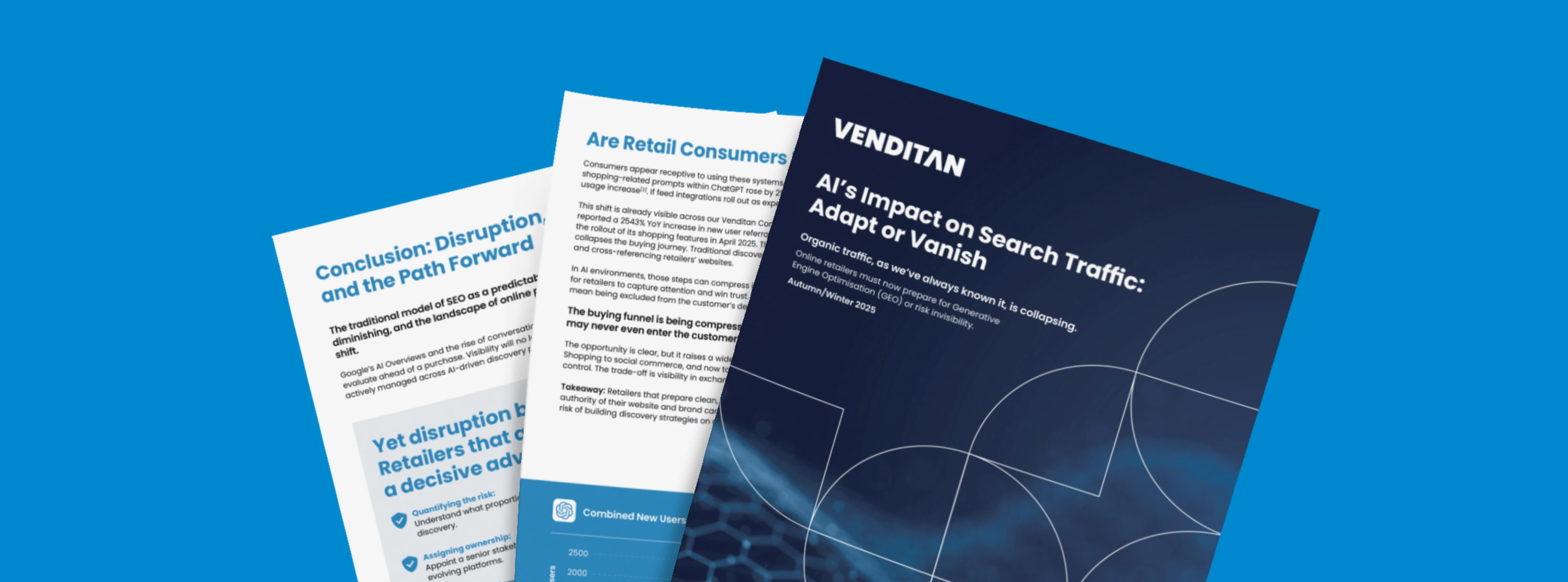I’ll spare you a lengthy introduction to artificial intelligence. Computer systems handling tasks that traditionally require humans is far from new. It has long surpassed the 'emerging' stage, with thousands of 'AI-driven' tools available on the market attesting to its maturity.
It feels like there is now a clamour to introduce AI into eCommerce operations, all in the interest of efficiency, effectiveness, and productivity.
However, as Jeff Goldblum's character Ian Malcolm lamented in the 1993 classic 'Jurassic Park,' 'your scientists were so preoccupied with whether or not they could, that they didn't stop to think if they should.'
Stick with me as I assess the positive ways in which AI is changing the eCommerce landscape, along with the very real challenges and considerations that surround the technology.
This may help you conclude AI's short and long-term role in your own eCommerce business, or just provide an enjoyable read!
How is AI changing eCommerce?
AI technologies are being widely adopted by eCommerce businesses to enhance various aspects of their operations and improve the experience that they deliver for their customers.
Here, I will try to break down the latest applications and discuss the benefits that AI can provide.
If you just want to flick through the article, use the quick links below.
- Increase order fulfilment efficiency
- Monitor inventory in real time
- Price products dynamically
- Deliver excellent eCommerce website experiences
- Protect against suspicious activity
- Produce rich content
Increase order fulfilment efficiency
Customers expect their orders to be accurate, delivered on time, and with minimal friction.
To meet these expectations, online retailers are turning to AI-driven Order Management Systems (OMS) to revolutionise their order fulfilment processes, aiming to accurately fulfil orders at the fastest possible pace, and achieve substantially more in a day without ever increasing their warehouse headcount.
Let's consider a specific example from our eCommerce Platform.
Our Receiving and Putaway handheld software guides the placement of newly received goods into designated storage areas according to various criteria and priorities. This eliminates the need for guesswork and ensures that the staff member follows the most time-efficient route.
Systems can utilise AI automation to change the status of orders based on predefined criteria, eliminating the need for manually green-lighting orders into the next stage of fulfilment. For instance, the OMS can be configured to automatically update an order from packed to shipped upon collection of the package by the designated courier.
By intelligently applying these status changes, retailers can provide customers with real-time updates on their orders, without relying on a member of staff having to manually update the status of each order after dispatch.
These are just a few of the many possibilities that AI can offer in the realm of order management. AI can empower retailers to work more efficiently, ultimately saving time and enhancing the overall customer experience.

Monitor inventory in real time
Retailers across all industries face the challenge of maintaining optimal stock levels that keep them agile while still meeting customer demands.
Traditional methods of inventory management are falling increasingly short in this endeavour, particularly when retailers and distributors are operating multiple stores and warehouses simultaneously.
By continuously monitoring inventory in real-time, AI-driven systems can do more to prevent issues related to stockouts and overstocking.
These systems use a combination of data sources, including current inventory levels, order history, market trends and seasonality to alert a retailer when a stockout is projected, and run predictive analytics that they can use to inform their sourcing and purchasing.
This proactive approach allows for timely replenishment and minimises the risk of customers encountering out-of-stock products. At the same time, AI can ensure that excess inventory doesn't accumulate, helping businesses save on storage costs and reduce the likelihood of being left wondering how to deal with excess stock.
Price products dynamically
In a landscape characterised by fierce competition, fluctuating consumer preferences, and rapidly shifting markets, retailers are continually searching for ways to optimise their pricing strategies.
One approach that has gained significant traction is dynamic pricing, a technique that harnesses the power of AI to set prices in real time.
Through AI algorithms, retailers can continuously monitor market conditions, competitor prices, and consumer behaviour, enabling them to maintain competitive and relevant pricing.
This approach also eliminates human bias from the pricing process, leading to data-driven decisions that maximise profits while adhering to established business rules and goals.
Of course, retailers must make ethical choices when implementing dynamic pricing, ensuring that they do not engage in price discrimination or unethical pricing practices.
Deliver excellent eCommerce website experiences
While all of the above strategies can offer substantial benefits, their impact will remain limited unless a consistent flow of orders is generated for the business.
eCommerce businesses strive to distinguish their website experiences within the increasingly crowded digital marketplace. In a landscape teeming with online competitors, crafting a distinctive and memorable shopping journey has become indispensable for optimising conversion rates and nurturing long-term customer relationships.
So, how can AI help in this regard?
A new level of personalisation
Machine learning can help gain a better grasp on the likelihood of a user taking specific actions, like making a purchase, choosing a shipping method, or leaving items in their cart.
By combining this valuable data with their existing customer information, advanced AI systems empower retailers to gain a deeper understanding of their customers and segments.
This, in turn, enables the automation of actions that enhance and personalise the shopping experience for improved outcomes, such as highly tailored product recommendations, personalised content, and unique offers.
AI-driven site search
Effective search functionality serves as the foundation of any thriving eCommerce website, and AI is ushering in a transformation of what’s possible in this area.
AI-driven search engines possess the ability to comprehend and interpret user queries expressed in natural language. This empowers shoppers to search using everyday language, ultimately enhancing the accuracy of search results. This capability is known as Natural Language Processing (NLP).
Additionally, AI facilitates the implementation of Semantic Search functionality, allowing a profound understanding of the context within search queries. Semantic Search goes beyond mere keyword matching, comprehending user intent and presenting products that align with their specific needs.
This is especially beneficial for retailers offering a broad array of technical parts or products tailored to solve intricate challenges. Users can search by explaining their challenge, and the website would comprehend the semantics and promptly present the relevant products to address the challenge.
Always-on customer support
The digital age has raised customer expectations. Customers now anticipate round-the-clock support, which is a logistical challenge for retailers. The sheer volume of customer queries can overwhelm support teams, and the responses provided may vary across team members.
Chatbots have been a topic of interest among retailers for several years. However, they have often failed to meet expectations in the level of service they provide to customers, leaving them frustrated with overly simplistic robots that can't effectively address their queries.
There's hope that as AI continues to evolve, it will breathe fresh life into this technology and offer a viable customer support solution. This solution would be available 24/7, capable of handling any volume of inquiries, providing consistent and prompt responses. Ultimately, it could help retailers overcome resource limitations they may encounter with customer support.
Protect against suspicious activity
Protecting against suspicious activity, especially in the form of fraudulent payments, cyber threats, and suspicious website behaviour, has become an ongoing challenge. However, AI has emerged as a powerful ally, offering innovative solutions to address these challenges.
Payment fraud detection:
- Anomaly Detection: AI algorithms can analyse transaction data to identify unusual patterns or discrepancies, flagging potentially fraudulent payments for further investigation.
- Behaviour Analysis: AI can track user behaviour, identifying irregularities in transaction patterns or sudden changes in purchasing habits.
Cyber threat detection:
- Network Traffic Analysis: AI can monitor network traffic for irregular patterns, enabling the early detection of DDoS attacks and unusual data access.
- Phishing Detection: AI algorithms can analyse emails and messages for phishing attempts and malicious links, helping to protect against cyber threats.
- Threat Intelligence: AI systems can integrate threat intelligence data to identify emerging risks and vulnerabilities.
The ONS’s June 2023 research “Understanding AI uptake and sentiment among people and businesses in the UK” reported that: “Of those businesses currently using or planning to use one of the specified AI applications, the most common reasons for doing so was improving cybersecurity (35%) and creating efficiencies (35%).”

Produce rich content
AI is a game-changer in retail content generation, offering a solution to the challenges of speed, consistency of quality and SEO optimisation.
By leveraging AI-powered tools, such as an AI-Generated Product Description generator, marketing teams can create high-quality, engaging content efficiently and effectively.
AI content generators are often trained on large datasets of existing content created by the brand. This training data includes various examples of content, such as product descriptions, blog posts and social media updates. By using this training data, AI systems learn the brand's specific writing style, tone, and preferences, which helps maintain consistency.
AI can also be used to enhance product media (mainly images) but AI alone typically does not generate original product images from scratch. Instead, AI can assist in various aspects of product image processing and enhancement.
Challenges and considerations of AI in eCommerce
AI has emerged and will continue to mature as a pivotal technology that promises significant opportunities in how retailers operate and develop improved experiences for their customers.
However, beneath the promises and potential, a set of challenges and critical considerations lies, which retailers must navigate with diligence.
They are:
Data privacy and security
As AI continues its rapid advancement, so do the growing concerns about data privacy and security in its current state.
AI systems require substantial amounts of data for training, often encompassing sensitive personal and business information. The handling and storage of this data raise concerns regarding unauthorised access, data breaches, and potential misuse. Data privacy has become a significant concern in AI, with regulations such as GDPR featuring provisions related to data collection, processing, and consent for AI applications.
Similar to any software, AI models may harbour vulnerabilities that malicious actors can exploit. Attackers can manipulate AI systems, resulting in erroneous or harmful decisions.
Moreover, AI models, particularly deep learning models, often pose challenges due to their classification as 'black boxes.' Deciphering the rationale behind a specific decision made by an AI system can be tough, prompting inquiries about accountability when issues arise.
This leads nicely to the second consideration, which is the trust of your customer.
Customer trust
Even if you have a wholly positive outlook on AI, and have identified ways in which it can positively impact your eCommerce business, it would be unwise to believe that all of your customers share that same outlook.
Customers want to understand and trust the systems they interact with, and the opacity of AI can create a barrier to building that trust.
AI technology can be used in ethically questionable ways, such as the creation of deepfakes or manipulation of content. These ethical dilemmas can leave customers feeling uncertain about the authenticity and integrity of the service you are providing, so there is a task to prove your compliance and security.
The ethics of AI in eCommerce
The ethical discourse around Artificial Intelligence (AI) is gaining significant prominence as AI technologies continue to advance. It revolves around multifaceted questions about the responsible use of AI and its implications on society.
One of the key ethical concerns centres on bias and fairness. AI systems can inherit biases from the data they are trained on, potentially leading to discriminatory outcomes. Addressing these biases is crucial to ensure fairness and equal treatment.
There are broader questions about the impact of AI on the workforce and the displacement of jobs. The ethical discourse emphasises the need for responsible AI development, robust regulations, and ethical guidelines to ensure that AI technologies benefit society without compromising fairness, privacy, or human values.
The evolving nature of AI and its complex ethical challenges make it imperative for stakeholders to engage in ongoing discussions and initiatives to shape a future where AI aligns with ethical principles and the greater good.
The maturity of AI technology
The rapid pace of AI development can result in immature or unreliable solutions. With new AI-driven solutions entering the market at such a rapid pace, concerns also emerge regarding the quality and robustness of these products.
Some businesses may adopt AI as a mere buzzword, prioritising quick gains over genuine long-term solutions.
The need for continuous monitoring of AI technology is a fundamental consideration in its development and application. AI systems are not static; they evolve, adapt, and learn from new data. As a result, ongoing oversight is essential to ensure their performance, accuracy, and ethical compliance.

The five steps towards adopting AI in eCommerce
Any business in any sector considering AI should consider the five steps towards adoption.
These set out to provide a framework for a business to follow when considering AI for their eCommerce business.
- Assessment and Strategy: Assessing your readiness and strategic goals for AI adoption. Evaluating how AI can benefit your operations, identifying potential use cases, and setting clear objectives.
- Data Preparation and Infrastructure: Focusing on data readiness. Data is a foundational element of AI, and it needs to be collected, cleaned, structured, and stored effectively.
- Pilot Projects and Prototyping: Launching pilot AI projects to test and validate their concepts. These pilot projects are typically small in scale, serving as proof of concept.
- Deployment and Integration: Moving to the deployment and integration stage after successful pilot projects. Scaling up AI initiatives and integrating them into core business processes.
- Optimisation and Improvement: Monitoring AI systems, gathering feedback, and refining the models and processes.
I cannot deny that AI has great potential for enhancing eCommerce businesses, and I expect it to continue improving process efficiency and enhancing customer experiences. However, my doubt arises when considering tasks that require reasoning. AI often functions as data-driven models.
When the task is straightforward and has clear binary outcomes, the benefits of AI are evident. Nevertheless, I believe that AI currently lacks the sophistication required to completely replace human input in areas where intuition and deep understanding are crucial, such as creating truly engaging and valuable content for readers.
Regarding our work at Venditan, we are consistently developing with AI and exploring how to utilise the technology to provide new and valuable features for our platform that our clients can benefit from.
Our recent posts
Keep up to date with the latest news and insight from the team at Venditan
-p-2600.webp)







.webp)

